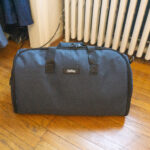Optimal elimination shouldn’t be confined to your home. When you’re traveling, maintaining your digestive health can be challenging, and toilet posture is often overlooked. The Squatty Potty Travel stool, also known as Porta-Squatty™, is designed for nomads and frequent travelers, ensuring you can enjoy the benefits of squatting for a more comfortable and complete bathroom experience wherever you are.
 Folded Squatty Potty Travel Stool
Folded Squatty Potty Travel Stool
The Importance of Squatting Posture, Even When Traveling
Our bodies are naturally designed to squat for effective bowel movements. The modern western toilet, while convenient, puts us in a seated position that can hinder this natural process. This seated posture creates a kink in the colon, making elimination less efficient and potentially leading to straining and discomfort. This issue doesn’t disappear when you travel; in fact, changes in diet, routine, and unfamiliar bathrooms can exacerbate digestive issues on the road.
How Squatting Works for Easier Elimination
In simple terms, your body has a natural bend in the colon that helps to control bowel movements. The seated position on a standard toilet accentuates this bend, creating a blockage. The Squatty Potty Travel stool works by elevating your feet, mimicking a natural squatting position. This straightens out the colon, releasing the kink and allowing for a smoother, more complete, and less strained elimination.
Porta-Squatty™: Designed for the Traveler
The Porta-Squatty™ travel stool brings the proven benefits of squatting to your suitcase. It’s constructed from durable plastic, ensuring it can withstand the rigors of travel while remaining lightweight and easy to carry. Its foldable design is key for travelers, allowing it to pack flat and discreetly in your luggage or carry-on bag.
Features and Benefits of the Travel Squatty Potty
- Designed for Travel: Specifically made for those who are frequently on the move.
- Durable and Long-lasting: Made from robust plastic to endure travel conditions.
- Folds for Portability: Easy to fold and unfold, saving space in your luggage.
- Promotes Proper Alignment: Helps achieve the ideal squatting posture for easier and more effective elimination.
- Hygienic and Easy to Clean: Made of plastic for clean and sanitary use, wherever you are.
- Supports Better Digestive Health: Contributes to overall wellness by promoting natural and efficient bowel movements.
 Folded Squatty Potty Travel Stool
Folded Squatty Potty Travel Stool
Clinically Supported Benefits
The effectiveness of squatting and devices like Squatty Potty is supported by scientific research. Studies have shown that using a footstool to mimic squatting can:
- Increase the feeling of emptiness by up to 85%
- Reduce time spent on the toilet by up to 71%
These findings highlight the real benefits of optimizing toilet posture, especially for those seeking relief from constipation or aiming for better digestive health while traveling.
Compact and Convenient Details
The Travel Squatty Potty is thoughtfully designed for practicality:
- Recyclable Materials: Made with environmentally conscious, recyclable plastic.
- Discreet Carry Bag: Includes a bag for discreet transport and storage.
- Folded Dimensions: 380 x 175 x 25 mm, compact enough to fit in most bags.
- Lightweight: Weighs only 900 grams, adding minimal weight to your luggage.
Travel Easier and Healthier with Porta-Squatty™
For anyone who values digestive health and comfort while traveling, the Travel Squatty Potty is an indispensable tool. It’s easy to use, simple to pack, and provides significant benefits backed by science. Don’t let travel disrupt your natural rhythm – maintain comfortable and complete elimination wherever your journey takes you with the Porta-Squatty™ Travel stool.
References:
- Modi, Rohan M. MD, et. al. Implementation of a Defecation Posture Modification Device, March 2019.
- Sikirov, Dov MD. Comparison Of Straining During Defecation In Three Positions, July 2003.
- Rad, Saeed MD. Impact Of Ethnic Habits On Defecographic Measurements, April 2002.
- Sakakibara, Ryuji. Influence Of Body Position On Defecation In Humans, June 2010.

